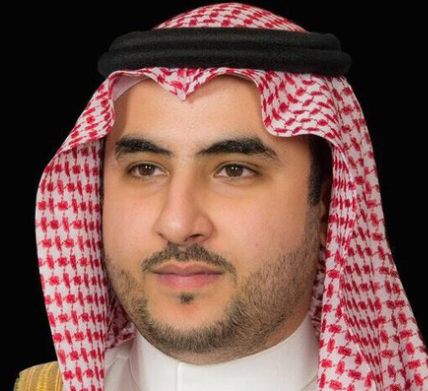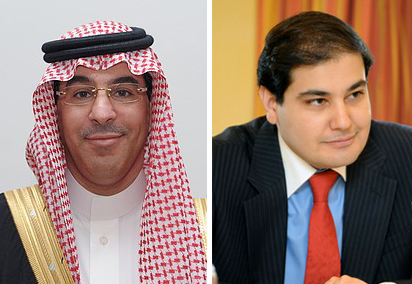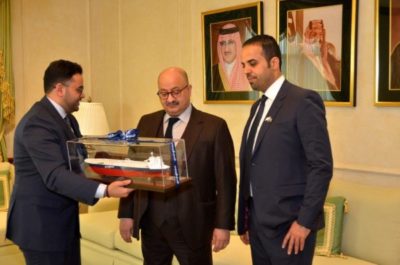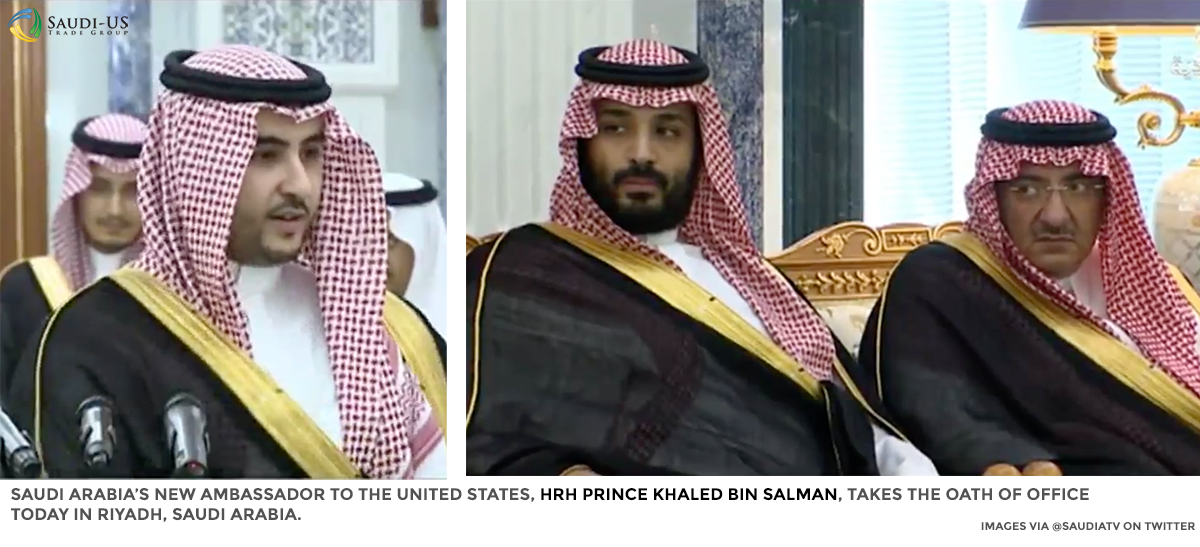Over the weekend, Saudi Arabia’s King Salman announced a series of major changes to key leadership positions, a new “national security center” for Saudi Arabia that is affiliated with the Royal Court, and more. Here’s what is different now for Saudi Arabia and what those changes mean for the Kingdom, U.S.-Saudi relations and Saudi Arabia’s Vision 2030 economic reform efforts.
1. Saudi Arabia’s New Ambassador to the United States

HRH Prince Khaled bin Salman.
Saudi Arabia has a new Ambassador to the United States – a son of the King. Prince Khaled bin Salman (“KBS”) Al Saud is a young former fighter pilot that carried out airstrikes on Daesh in the region. Prince Khalid received a Bachelor of Aero Science from King Faisal Air Academy, and studied for a certificate at Harvard and was in pursuit of a Master’s degree at Georgetown University in Washington, D.C. He was also stationed at Columbus Air Force Base in Mississippi, where he trained to fly F-15 fighter jets.
Prince Khaled Bin Salman replaces Prince Abdullah bin Faisal bin Turki, who served as Saudi Arabia’s Ambassador to the United States since October, 2015. Prince Abdullah was keen to promote women within the Embassy’s staffing ranks and was a big proponent of Saudi art and culture. He recently penned an op-ed in the Wall Street Journal highlighting the U.S.-Saudi security partnership, and spoke at the opening of the recently completed U.S.-Saudi CEO Summit.
The new ambassador, Prince Khaled, continues the Kingdom’s recent preference for appointing relatively young royals to top positions in the Saudi government. As a military person, he is seen as likely to connect well with top military brass in the Trump administration.
2. Saudi Arabia’s New Minister of Culture and Information – A Former Footballer and Ambassador to Germany

Saudi Arabia’s new Minister of Culture and Information, Dr. Awad Al-Awwad, left, replaces Adel Al-Toraifi, right.
Saudi Arabia’s highly visible Minister of Culture and Information, Adel Al-Toraifi, has been replaced with Saudi Arabia’s former Ambassador to Germany, Dr. Awad Al-Awwad.
Al-Toraifi was frequently on Saudi television, in newspapers, and in the state-run Saudi Press Agency, which serves as a valuable window into the Kingdom – and which is underneath the Ministry of Culture and Information.
The Ministry’s top leadership positions has recently attracted top younger talent in the Kingdom, given the rise of social media and the importance of communication in the modern age.
Al-Awwad was a former goalkeeper for Saudi Arabia’s Al-Hilal FC. He is 45 years old, and has served as Ambassador to Germany since 2015. He received his Bachelor’s Degree from the Faculty of Administrative Sciences at King Saud University in Riyadh in 1992, his Master’s Degree in Banking Operations from the University of Boston in 1996 and obtained a PhD in Financial Markets from the University of Warwick in Britain in 2000.
3. A Reversal of Changes to Austerity Measures ‘after Public Outcry’
To the delight of public service employees and the Saudi stock market, Saudi Arabia reversed an earlier decision to slash benefits for those working in the public sector.
The king issued a royal decree restoring “all allowances, financial benefits, and bonuses” following calls for protests in four Saudi cities over the weekend, adding a two-month salary bonus for forces fighting in the kingdom’s intervention in Yemen, according to Reuters. In September, Saudi Arabia cut ministers’ salaries by 20 percent and scaled back perks for public sector employees.
The Saudi stock market responded, jumping up 1% on Monday.
4. A New Head of SAGIA

Saudi Arabia’s new Governor of SAGIA, Ibrahim Al-Omar, with the former Ambassador to the United States Prince Abdullah bin Faisal bin Turki last month at the Saudi Embassy in Washington.
The decrees named a new head of the Saudi Arabia General Investment Authority (SAGIA), Ibrahim Al-Omar.
Previously, Prince Saud bin Khaled was acting governor of SAGIA. Prince Saud has been an active and dynamic advocate for SAGIA and helped expand and transform the agency under the Saudi Minister of Commerce and Investment, Dr. Majed Al-Qassabi. Prince Saud recently spoke at the U.S.-Saudi CEO Summit.
Ibrahim Al-Omar was CEO of Bahri, Saudi Arabia’s state-owned shipping company and is one of the biggest shipping conglomerates in the world.
5. Establishing a National Security Center affiliated to the Royal Court
Not much is clear about the newly established National Security Center by royal decree, except for two things. First, the new security center will be “affiliated” with the Royal Court. That is an important detail in the Kingdom. In the United States, all branches of the armed forces are loyal to the constitution, not the President. In Saudi Arabia, the various military armed forces are not concentrated under one ruler or individual, which mitigates the chances of a military coup.
The second key detail about the National Security Center is that the organization is modeled, down to the nomenclature of the top “advisor,” after the United States.
“Designating the name ‘advisor’ resembles the nomenclature of the axial states, such as the United States, where the position is of high importance in the chain of command,” writes the London-based, pro-government Asharq Alawsat newspaper. “Security centers are very crucial in the states as they are considered an assembly of centers for strategic studies which analyze data and enhance decision making in the country.”
6. Changes to Saudi Arabia’s Powerful Regional Governors
All politics is local, and that goes for Saudi Arabia, even as a monarchy. Regional governors are powerful and influential positions in the Kingdom as they handle many local affairs that are key to the Kingdom’s day-to-day operations.
Royal decrees issued over the weekend replaced the governor of the Hail region with Prince Abdulaziz bin Saad. Prince Faisal bin Khalid bin Sultan was charged to lead the Northern Border region of Saudi Arabia.
7. No Exams During Ramadan
Many Saudi students across the Kingdom were fearful that their exams would take place during the month of Ramadan, which comes early in the summer this year. The combination of traditional fasting during Ramadan combined with the sweltering heat could affect the students’ performance during exam time.
That concern reached its way up to King Salman, who included in the Royal Decrees a stipulation that no exams could take place during Ramadan this year.
Students across the Kingdom appeared to cheer the decision on social media sites.









